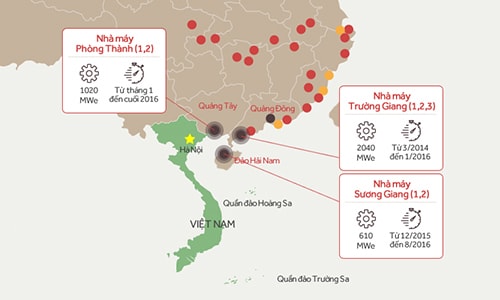Vietnam sends people to China to work on nuclear power near the border
Faced with China's construction of three nuclear power plants near the border, Vietnamese authorities organized a working delegation to work with the unit in charge of nuclear safety in the neighboring country.
A Foreign Ministry spokesman has just said that Vietnam has proposed that China soon establish a mechanism for regular information exchange on three nuclear power projects near the border.
Previously, China put into operation three nuclear power plants including Fangcheng (Guangxi) with a capacity of 1,000 MW, Changjiang (Guangdong) with a capacity of 600 MW and the 650 MW unit of Shuangjiang (Hainan Island). These plants are all located near the northern border of Vietnam, the closest one is Fangcheng, only 50 km from Mong Cai, Quang Ninh, and less than 500 km from Hanoi.
Mr. Vuong Huu Tan, Director of the Department of Nuclear Radiation Safety (Ministry of Science and Technology) said that the signing of cooperation with China in this field was carried out since 2012, but in reality, it has not been implemented much. However, Vietnam has participated in many international conventions such as the Early Notification Convention, which means that any nuclear incident will be notified by the international network.
Vietnam also participates in the Nuclear Safety Convention. Accordingly, every year, countries must report on their nuclear power development status, and Vietnam has the right to question and request China to explain. "In the near future, the Department will organize a working delegation to work with the Chinese nuclear safety agency to soon reach an agreement on the best information exchange," said Mr. Tan.
 |
| Location of three Chinese nuclear power plants near Vietnam. Graphics: Tien Thanh. |
Don't panic, but don't be complacent
"Vietnam has nothing to worry about as three Chinese nuclear power plants near the border have come into operation," said Tran Chi Thanh, Director of the Vietnam Atomic Energy Institute, adding that France is building many plants near Germany, as are many other European countries, but there have been no disputes or conflicts over this.
According to Mr. Thanh, for nuclear power, safety is the world's top concern, so the construction of nuclear plants becomes an international issue, not just a national issue. With the new design of the current generation 3 or 3+ reactors, China can completely control when a major incident occurs, the radiation will be contained within the reactor building and not released outside. Even in the worst case of a leak, the radiation released will be at a low level and will not affect human health.
Because safety is increasingly guaranteed in new designs today, the radius from nuclear power plants to residential areas is getting narrower. If before this distance was 5 km, then it was reduced to 3 km, and now it is just the factory fence, meaning people still live around it.
"The designs of new nuclear power plants almost do not have a radius of control area, but are all factory fences. China certainly also cares about safety first when building nuclear power plants, and cares about the lives of their people first," said Mr. Thanh.
Agreeing with the view that "people should not panic about nuclear power plants", expert Tran Huu Phat warned that Vietnam should not be subjective and needs to carefully prepare plans to prevent incidents.
"International experience shows that most nuclear power accidents originate from human factors during operation, not technology. In addition, natural disasters such as tsunamis are unpredictable. That is why countries have to take countermeasures when building nuclear power plants," said Mr. Phat.
Building an online radiation monitoring network According to experts, Vietnam is building an online radiation monitoring network and aims to have seven stations in operation by 2020 in Quang Ninh, Lang Son, Lao Cai, Hanoi, Lang Son and two other locations in the Central region. These monitoring points will help Vietnam identify and provide early warning of radiation so that the best response measures can be taken. |
According to VNE
